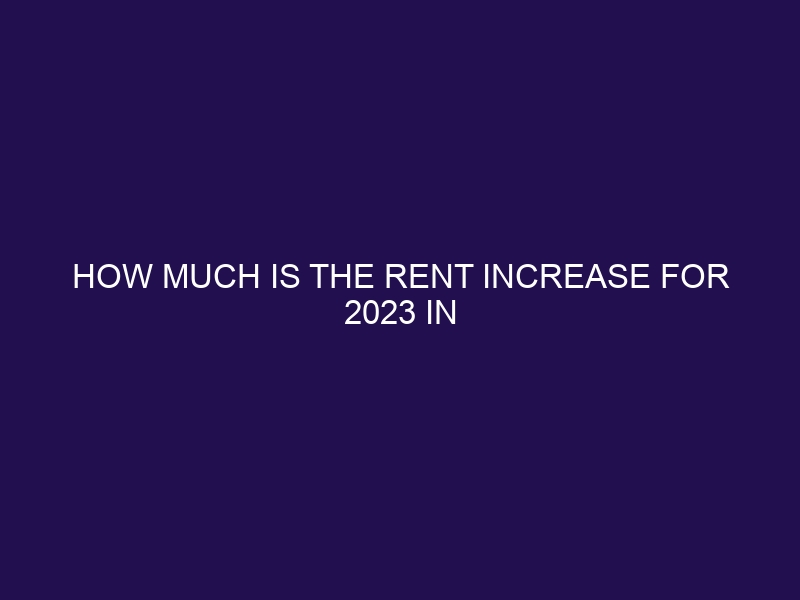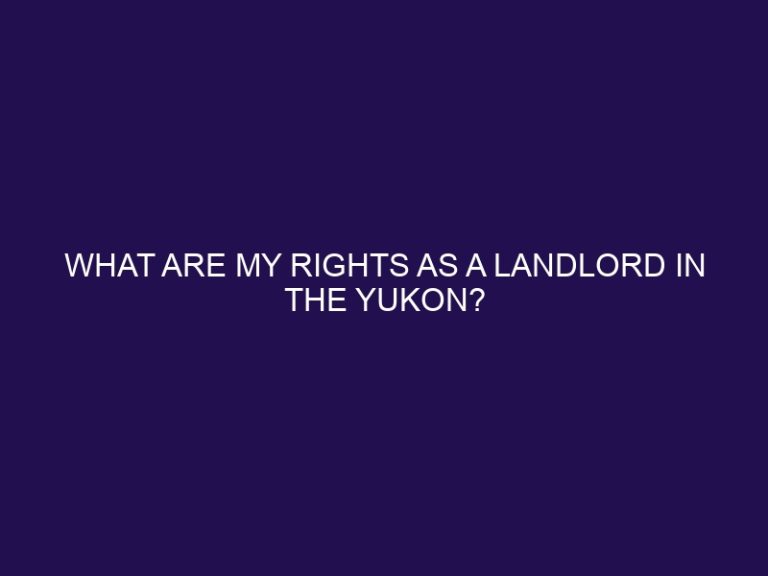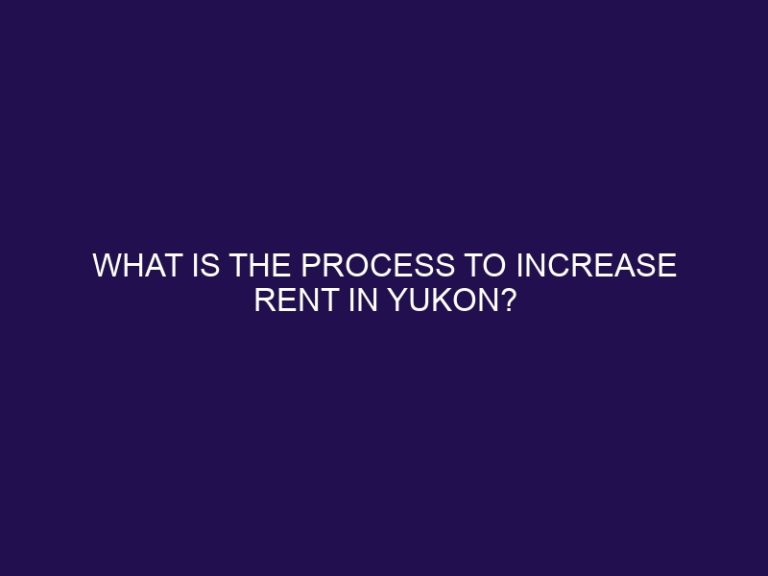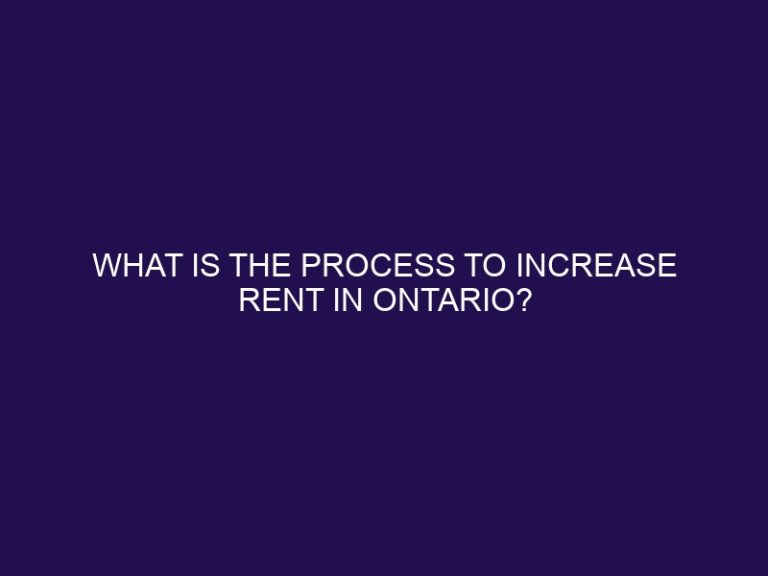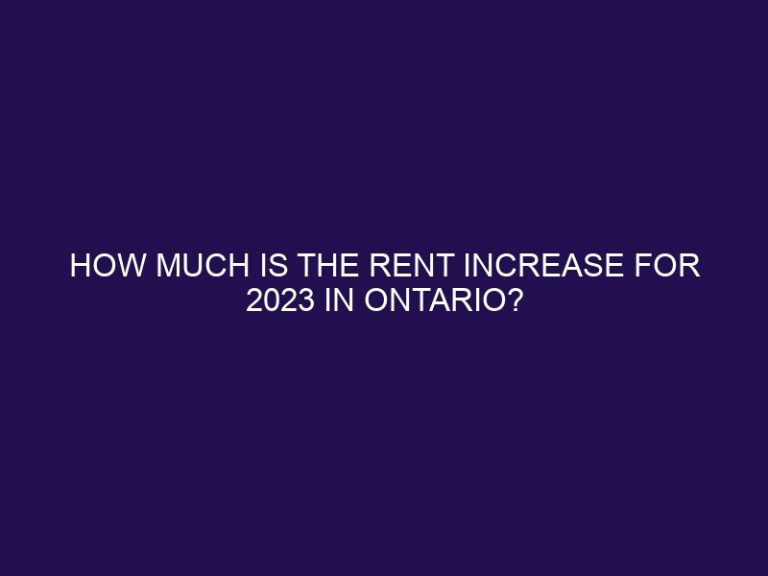How much is the rent increase for 2023 in Manitoba?
.jpg)
Rent control laws play a crucial role in ensuring fair and affordable housing for tenants in various regions, including Manitoba. Understanding these laws and the factors that determine rent increases is essential for both tenants and landlords. In Manitoba, specific regulations govern rent control, and knowing how these laws work can help tenants and landlords navigate the rental market more effectively.
Rent control refers to government-imposed restrictions on the amount and frequency of rent increases that landlords can implement in rental properties. These laws aim to protect tenants from steep and unjustifiable rent hikes, ensuring housing affordability and stability. In Manitoba, the rent control laws are designed to strike a balance between the rights and interests of both tenants and landlords.
To determine the rent increase for 2023, several factors come into play. Current economic conditions, inflation rates, property expenses, and market demand and supply are crucial considerations for landlords. It’s essential to understand how these factors influence rent adjustments to anticipate any potential changes in rental costs.
While landlords have the right to increase rent within certain limits, there are specific procedures and guidelines they must follow. These include providing proper notice to tenants, adhering to the maximum allowable rent increase set by the government, and resolving any disputes through an established dispute resolution process.
Tenants and landlords in Manitoba have access to important resources to help them understand their rights and responsibilities. The Manitoba Residential Tenancies Branch serves as a valuable resource for information on rental regulations and dispute resolution. tenants and landlords can access specific rights and resources tailored to their needs, ensuring they are well-informed when it comes to rental agreements and conflicts.
By understanding rent control laws, the factors influencing rent increases, and the necessary procedures and resources available, tenants and landlords in Manitoba can navigate the rental market more confidently and ensure a fair and harmonious rental relationship.
Key takeaways:
- Rent control laws in Manitoba: Rent control laws in Manitoba determine the rules and regulations for rent increases in the province.
- Factors affecting rent increase for 2023: The rent increase for 2023 in Manitoba is influenced by current economic conditions, inflation rate, property expenses, and market demand and supply.
- Procedures and guidelines for rent increase: Manitoba has specific guidelines for the notice period, maximum allowable rent increase, and dispute resolution process when it comes to implementing a rent increase.
Understanding Rent Control Laws in Manitoba
In Manitoba, it is crucial for both tenants and landlords to understand the rent control laws. These laws aim to regulate the amount and frequency of rent increases. Here are the key points to consider in relation to rent control laws in Manitoba:
| 1. Rent Increase Limits: | Rent increases in Manitoba are annually capped based on the Rent Increase Guideline, which is set by the government. |
| 2. Notice Requirements: | Landlords must provide proper written notice to tenants before increasing the rent. |
| 3. Justifications for Increases: | Rent increases can only be justified for specific reasons, including expenses for repairs or renovations. |
| 4. Dispute Resolution: | In cases where tenants and landlords disagree on the rent increase, they have the option to seek resolution through the Residential Tenancies Branch. |
By having a clear understanding of these rent control laws in Manitoba, both tenants and landlords can ensure compliance with the regulations and promote fair treatment.
What Is Rent Control?
What Is Rent Control?
Rent control is a government measure that regulates the amount landlords can increase rent. In Manitoba, rent control laws aim to protect tenants from excessive rent hikes and ensure housing affordability. These laws set limits on the frequency and amount of rent increases, preventing landlords from raising rents arbitrarily.
What Is Rent Control? Rent control works by considering factors such as current economic conditions, inflation rate, property expenses, and market demand and supply. It provides stability for tenants and gives them the ability to plan their housing costs. Importantly, rent control laws also outline procedures and guidelines for rent increases and provide dispute resolution processes for tenants and landlords. Rent control is a critical aspect of ensuring fair and affordable housing for individuals and families in Manitoba.
What Are the Rent Control Laws in Manitoba?
Rent control laws in Manitoba refer to regulations that exist to oversee the amount and frequency of rent increases, aiming to safeguard tenants from rapidly soaring housing costs. These laws establish specific guidelines that landlords must follow whenever they decide to raise rent. They encompass various crucial elements such as notice periods for rent increases, maximum permissible percentages for rent hikes, as well as a dispute resolution procedure designed to address tenant complaints. It is through these laws that landlords are prevented from arbitrarily raising rents, as they have to take into account factors such as economic conditions, inflation rate, property expenses, and market demand and supply. As a result, these rent control laws in Manitoba ensure stability and affordability within the rental market, providing tenants with a sense of security.
How Does Rent Control Work in Manitoba?
Rent control in Manitoba works by setting limits on the amount landlords can increase rent. This helps protect tenants from excessive rent hikes and ensures affordable housing options. The rent control laws in Manitoba consider various factors such as current economic conditions, inflation rate, property expenses, and market demand and supply. Landlords must follow procedures and guidelines for a rent increase, including providing a notice period and adhering to the maximum allowable rent increase set by the Residential Tenancies Branch. Disputes regarding rent increases can be resolved through the dispute resolution process. Tenants and landlords can find important resources and support from organizations like the Manitoba Residential Tenancies Branch.
How Does Rent Control Work in Manitoba?
Factors That Determine Rent Increase for 2023
Wondering what factors will determine the rent increase for 2023 in Manitoba? Let’s dive in and explore the key elements that play a role in determining the rental costs. From the current economic conditions and inflation rate to property expenses and market demand and supply, we’ll shed light on the various aspects that influence the upcoming rental prices. Get ready to uncover the fascinating dynamics of the Manitoba rental market for the year ahead!
Current Economic Conditions
The current economic conditions heavily influence the rent increase for 2023 in Manitoba. Economic growth, inflation rate, and the overall market situation are key factors that shape the rental market. If the economy is prospering and experiencing robust growth, there will likely be a higher demand for rental properties, resulting in a potential increase in rent. Conversely, in a weak economy with low growth and high unemployment rates, the demand for rental properties might decrease, leading to a more stable or even decreased rent. Both landlords and tenants must take into account the current economic conditions when negotiating rent increases to ensure fair and reasonable outcomes.
Inflation Rate
The inflation rate is a key factor in determining rent increases in Manitoba. It reflects the rate at which prices for goods and services are increasing over time. An understanding of the inflation rate allows landlords to adjust rents accordingly to cover rising costs. In Manitoba, the inflation rate is influenced by various economic factors, such as changes in wages, taxes, and government policies. Landlords must consider the inflation rate when determining the maximum allowable rent increase for the upcoming year. By staying informed about the inflation rate and its impact on the cost of living, landlords can ensure fair and reasonable rent adjustments for their tenants.
| Factors Influencing Inflation Rate | Impact on Rent Increase |
|---|---|
| Economic growth | If the economy is growing, inflation is likely to increase, leading to higher rent increases. |
| Government policies | Changes in government policies, such as tax adjustments, can affect inflation and subsequently impact rent increases. |
| Cost of living | If the cost of living is rising due to increased prices for goods and services, landlords may need to adjust rents to cover these expenses. |
Property Expenses
Property expenses are a crucial aspect when it comes to determining rent increases in Manitoba. Landlords must take into account various expenses associated with maintaining and managing rental properties. These expenses encompass:
All of these expenses can significantly impact the affordability and profitability of rental properties. When deciding on the extent of rent increase for the year, landlords may take these expenses into consideration. It is essential for both tenants and landlords to be aware of property expenses in order to ensure fair and reasonable rent increases.
Market Demand and Supply
The market demand and supply play a crucial role in determining rent increases in Manitoba. Here is a table illustrating how these factors impact the rental market:
| Market Demand | Market Supply | Rental Market |
| High demand for rental properties leads to increased competition among tenants. | An excess supply of rental properties results in decreased rental prices. | In a balanced rental market, rent increases are more moderate. |
| Low demand for rental properties allows landlords to increase rents without losing tenants. | A limited supply of rental properties enables landlords to increase rents due to a higher demand. | In a tight rental market, rent increases are more significant. |
Understanding the dynamics of market demand and supply is essential for tenants and landlords to navigate rent increases. It is crucial to stay informed about the current rental market conditions to make informed decisions regarding rent adjustments.
Procedures and Guidelines for a Rent Increase
Looking to navigate the rental landscape in Manitoba for 2023? This section has got you covered! Discover the essential procedures and guidelines for a rent increase, including the notice period, maximum allowable increase, and the dispute resolution process. Stay informed on the rules and regulations that govern rent hikes in Manitoba and ensure you’re equipped to make informed decisions. Let’s dive into the details and arm you with the knowledge you need before making any adjustments to your rent.
Notice Period for Rent Increase
The notice period for rent increase in Manitoba is a crucial factor to consider for both tenants and landlords. According to the rent control laws in Manitoba, landlords are required to provide tenants with a written notice of the rent increase, ensuring a notice period for rent increase of at least three months before the proposed increase takes effect. This generous notice period allows tenants sufficient time to plan for any adjustments in their budget or explore alternative housing options if necessary. It is of utmost importance for landlords to adhere to this specific notice period to ensure a fair and transparent process. By diligently following the appropriate procedures and giving tenants ample notice, landlords can foster a positive and respectful relationship with their tenants.
Maximum Allowable Rent Increase
The Manitoba Residential Tenancies Branch sets the maximum allowable rent increase in Manitoba for 2023. This increase is influenced by various factors such as the current economic conditions, inflation rate, property expenses, and market demand and supply. Landlords are required to follow specific guidelines and procedures when raising rent, which include providing tenants with a notice period and adhering to the set maximum allowable increase. Both tenants and landlords should familiarize themselves with their rights and available resources to effectively navigate the rent increase process.
In the year 2022, Manitoba implemented a maximum allowable rent increase of 1.5% by considering the economic conditions and inflation rate. This increase aimed to find a balance between landlords’ need for fair returns on their investment and tenants’ concerns about affordability. The government collaborated closely with stakeholders to ensure that the increase remained reasonable and aligned with market conditions. This approach helped maintain stability in the rental market and provided predictability for both tenants and landlords.
Dispute Resolution Process
- Communicate: Start by discussing the issue with your landlord and try to reach a mutual agreement in the dispute resolution process.
- File a Complaint: If the issue remains unresolved, you can file a complaint with the Residential Tenancies Branch for the dispute resolution process.
- Mediation: The Branch may schedule a mediation session to help both parties reach a resolution in the dispute resolution process.
- Hearing: If mediation fails, a hearing may be conducted where evidence and arguments are presented in the dispute resolution process.
- Decision: The Branch will provide a written decision outlining the ruling on the rent increase in the dispute resolution process.
- Appeal: If you disagree with the decision, you have the right to appeal to the Residential Tenancies Commission for the dispute resolution process.
Fact: It is important to document all communication and keep records of any evidence related to the dispute resolution process.
Important Resources for Tenants and Landlords
Looking for valuable information on tenant and landlord resources in Manitoba? Look no further! In this section, we’ve compiled a treasure trove of crucial resources for both tenants and landlords. From the Manitoba Residential Tenancies Branch to tenant rights and resources, as well as essential information on landlord rights and resources, we’ve got you covered. Stay informed and equipped with the knowledge you need to navigate the rental landscape in Manitoba.
Manitoba Residential Tenancies Branch
The Manitoba Residential Tenancies Branch (RTB) is a government agency that regulates and enforces the Residential Tenancies Act. It provides information and resources to both tenants and landlords in Manitoba. The RTB assists in resolving disputes, such as disputes regarding rent increases, security deposits, or lease agreements. Tenants can access resources on their rights, responsibilities, and how to file a complaint or seek assistance. Landlords can find information on their obligations, including proper notice periods for rent increases and guidelines for maximum allowable rent increases. The RTB plays a crucial role in maintaining a fair and balanced rental market in Manitoba.
Fun Fact: The RTB also offers a free, confidential mediation service for tenants and landlords to resolve disputes without going to court.
Tenant Rights and Resources
Tenant rights and resources are essential for tenants to know about in order to protect their rights and navigate any issues they may face in their rental properties. It is crucial for tenants to be aware of the following important resources:
- The Manitoba Residential Tenancies Branch: This is the official government agency that provides information and resources for tenants. They offer guidance on tenant rights, tenancy agreements, and dispute resolution processes.
- Various organizations, such as tenant advocacy groups or legal aid clinics, offer valuable resources for tenants. These resources include information on tenant rights, eviction prevention, rent increases, and legal assistance options.
By familiarizing themselves with these tenant rights and resources, tenants are empowered to assert their rights, address any concerns, and seek assistance if needed.
Landlord Rights and Resources
Landlords in Manitoba have certain rights and resources, known as Landlord Rights and Resources, that they can rely on to ensure the smooth management of their rental properties. Here are some key resources and rights that landlords should be aware of:
- Manitoba Residential Tenancies Branch: Landlords can access information, forms, and resources on the official website of the Manitoba Residential Tenancies Branch. This resource provides guidance on various topics, including lease agreements, rent increases, and dispute resolution processes.
- Tenant Screening: Landlords have the right to screen potential tenants to ensure they meet the necessary criteria, such as a reliable income source and good rental history. This can help reduce the risk of problematic tenants and protect the landlord’s interests.
- Property Maintenance: Landlords have the responsibility to maintain safe and habitable living conditions for tenants. Regular property inspections and prompt repairs are essential to meet these obligations.
- Eviction Processes: In certain situations, landlords may need to initiate eviction proceedings. Familiarizing themselves with the legal requirements, such as providing proper notice and following the correct procedures, ensures that landlords exercise their rights appropriately.
By staying informed and utilizing these Landlord Rights and Resources, landlords can effectively navigate their rights and responsibilities, ultimately fostering a positive rental experience for both themselves and their tenants.
Some Facts About Rent Increase for 2023 in Manitoba:
- ✅ The rent increase guideline for 2023 in Manitoba has not been mentioned in the provided reference data. (Source: Our Team)
- ✅ Landlords in Manitoba must provide tenants with written notice at least three months in advance of a rent increase. (Source: Our Team)
- ✅ In most cases, rents in Manitoba can only be increased once per year. (Source: Our Team)
- ✅ There are exemptions in Manitoba where units do not have to follow the annual rent increase guideline, including various types of social housing and rental units owned by government entities. (Source: Our Team)
- ✅ Landlords in Manitoba have the option to apply for a larger rent increase if they can demonstrate that the guideline amount will not cover their incurred cost increases. (Source: Our Team)
Frequently Asked Questions
1. What is the rent increase guideline for 2023 in Manitoba?
The rent increase guideline for 2023 in Manitoba is zero percent. According to the Information for Landlords and Tenants fact sheet, no rent increase is allowed for this year under special circumstances.
2. How is the annual rent increase guideline determined?
The annual rent increase guideline is determined using a transparent method outlined in the Residential Rent Regulation. It is based on the percentage change in the average annual “All-Items” seasonally adjusted Consumer Price Index data published by Statistics Canada for Manitoba.
3. Can landlords increase the rent more than once a year?
No, in most cases, rents can only be increased once per year. Landlords must provide tenants with written notice at least three months in advance of a rent increase, as required by Sections 25 to 28 of the Residential Tenancies Act.
4. Are there any exceptions to the annual rent increase guideline?
Yes, there are exemptions where units do not have to follow the annual rent increase guideline. These include units renting for $1,615.00 or more per month, various types of social housing, rental units owned and operated by provincial, municipal, or federal governments, rental units in buildings first occupied after March 2005, not-for-profit life lease units, cooperative units, and approved rehabilitated rental units.
5. Can landlords apply for a rent increase higher than the guideline amount?
Yes, landlords have the option to apply for a larger rent increase if they can demonstrate that the guideline amount will not cover their incurred cost increases. This is known as an above-guideline increase and requires proper justification.
6. How can I submit a notice of rent increase to my tenants?
The Residential Tenancies Branch offers Notice of Rent Increase forms for landlords to use. These forms can be submitted electronically or filled and printed in a fill and print format. Landlords must provide tenants with written notice at least three months in advance of a rent increase, as required by Sections 25 to 28 of the Residential Tenancies Act.

